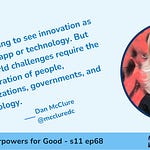Devin: Well, Joanne, what is your superpower?
Joanne: I definitely don't have a superpower. I think, as I said, it's really just staying inspired by the people that I'm working with and working for. And I think when I go to Malawi, and I see the work that the nurses are doing, I feel so much pride, and I feel so much joy to see the connections between the nurses and these communities. That's not something that you typically see between health care workers and patients. Health care workers typically are very overworked, very stressed and seeing maybe 80 patients in a day. Just to see their families laughing and chatting and this banter that they have, and the exchange and then the gratitude and the affection—also, seeing that in the nurses, which I also haven't seen previously in the hospitals in Malawi, that they also feel fulfilled in the work that they're doing. That just gives me so much inspiration. And then I come back like OK, we've got to do this—got to make it bigger. So, that's the source of the energy.
You can watch the full first interview with Joanne here: joanne.s4g.biz.
Joanne Chiwaula is a certified nurse-midwife and women’s nurse practitioner who founded the nonprofit African Mothers Health Initiative (AMHI) to help vulnerable babies and women in Malawi. With an undergraduate degree in international studies from Brown University and a master’s degree from the University of California at San Francisco, she is exceptionally well educated. She is a professional.
Early in her career, she worked for three years in Malawi at a hospital where 1,000 babies were delivered every month. While there, she learned about a tragic phenomenon. Babies born to mothers who don’t survive childbirth or die soon after face a mortality rate of 80 percent. Local custom concludes that babies just want to be with their mothers.
Joanne began personally following up with these babies, visiting them in their homes and communities, educating people on the babies’ care and helping to provide formula. Then, before moving to Ghana, she organized local nurses to do what she’d started.
She saw how quickly the local women were able to replicate and improve upon what she’d started. She then organized AMHI in the United States to raise money for the program in Malawi.
Now, 15 years later, hundreds of mothers and babies are in the program. The babies include the orphans and other vulnerable ones, including multiple births with higher mortality rates, partly because low-income mothers may not be getting meals regularly enough to nurse two or three children.
AMHI has a program for women if they’ve had a complicated delivery or lost a baby. A challenging delivery may result in losing her ability to have more children. Families or communities may shun women who’ve lost a baby or their uterus. The nurses now visit the women to educate their neighbors and families, dispel myths and rumors that lead to shunning and help women create incomes that provide security and confidence if other resources fail.
The program is dramatically successful, reducing infant mortality in these high-risk situations by up to two-thirds.
Though Joanne doesn’t see it as a superpower, the people she works with and serves inspire her to keep going. At first blush, this seems easy to believe and emulate, but many, if not most, people who help other people professionally sometimes tire of the interactions and their demands. Who hasn’t complained to a friend outside the office about a colleague’s behavior? Joanne’s example is crucial for us to understand.
How to Develop Being Inspired by Those You Work With and Serve as a Superpower
To better understand her superpower and how you can emulate it, I visited with Joanne again.
Joanne shared an inspiring story to help us understand what she’s saying.
One of the women who graduated from the AMHI program recently shared with Joanne how she got involved. A friend of hers had passed away, and when she attended the funeral, she discovered the friend had left a baby.
“And she saw the baby who was just a couple of days old, and she saw people diluting a soda. And she said, ‘Who is that drink for?’ And they said, ‘This is for the baby.’ She said, ‘No, you can't give that soda to the baby,’” Joanne reports.
The friends with the baby suggested that she take the baby and find an NGO in town that would feed and care for the baby. The woman took the baby but couldn’t find an NGO to help, so she returned with the baby. Hours later, the baby, carried by her sister, arrived at the woman’s home. The girl explained that the family and community had decided they couldn’t care for the baby, “You keep the baby and keep looking for an NGO.”
The woman, a mother of five, now had another mouth to feed. Finally, her husband said, “I don’t want this nonsense in my house. If you’re going to take care of this baby, you need to find a different place to live.”
Courageously, the woman concluded that the baby would not die on her watch, so she took the baby and began looking for someone to provide milk or formula. Finally, someone at a health center directed her to AMHI. The nurses there helped her and the baby for two years. That baby is now a healthy toddler.
“So, if she can do that, if she can say, ‘This baby needs to survive, and I'm willing to sacrifice my entire life for the survival of this child,’ I'm happy to share her story and do a little work trying to raise some money,” Joanne says. “I feel like I don't have any other option. If she can do that, I can do my small part.”
That is an inspiring story. Moreover, it hints at some critical lessons that Joanne shared.
1. Be there. To connect with your colleagues and the people you serve, you have to show up. Today that can include virtual participation, but you have to put in some time.
2. Slow down. The frenetic pace of 21st-century life distracts from the most important things. To make a connection, hear a story, and learn from those you serve, you have to slow down.
3. Listen. You’ll learn more and build a stronger connection from listening than from talking. Ask open-ended questions. Paraphrase to ensure you understand.
4. Be patient. Some of the people you serve and work with have experienced trauma. Who knows what word, what question, what situation could trigger anxiety. Don’t demand answers. Work to create a safe space for sharing and wait for it to come.
5. Empower locals. Joanne learned early on that local people could do better work serving people than she could. Nonetheless, she maintains a vital ongoing role as a fundraiser and spokesperson in the United States. Still, she recognizes that her role is to support the brilliant women doing the work in Malawi.
6. Empathize. Remember, Joanne says, that mothers in Malawi love their children as much as mothers elsewhere. It is tempting, she notes, to think that people surrounded by suffering somehow become immune to the pain. Not so. Mothers there suffer just as much when they lose a child.
If you seek inspiration from those you work with and serve, you’ll find it. It’s there. With that positive energy as a superpower, you can increase the good you’re doing in the world.
This is a sample chapter of my book, Superpowers for Good.























Being Inspired By Those She Works With and Serves Is Her Superpower